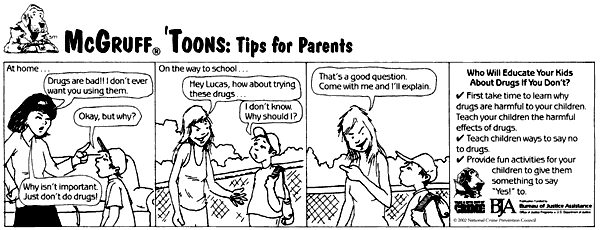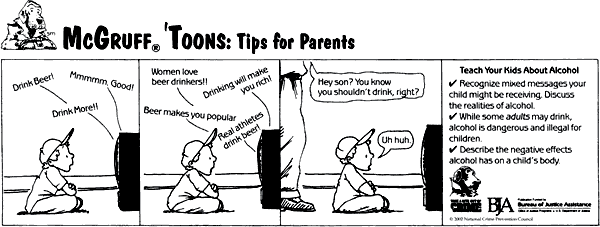|
Parent talk to your children about Drug & Alcohol use.
Conversations:
What to Say
The major reason you have to have a conversation with your child about drugs and alcohol is because
your kids need to be educated by you. They need to hear from their parents that teen drug and alcohol use is not condoned
in your family. They need to learn from their parents about the consequences of drug and alcohol use. Most importantly, the
need to be held accountable for their actions with drugs and alcohol use.
What happens if you suspect that your teen
is already using alcohol and drugs? What do you say to them? The conversation is the same: parents need to tell their kids
that drug and alcohol use by teens is not allowed in your family.
The issue won't go away until you do something.
You will get to the point where you can't deny that the problem exists. You'll have a continuous nagging feeling in the pit
of your stomach. You will simply have to acknowledge that your child has a problem, your child is using drugs and that won't
get any better until you take action on your child's behalf. It is OK to ask for help. In fact, getting help may make it easier
for you to have the conversation.
Working with Your Spouse Beforehand
Sometimes the beginning of a
conversation is harder than the middle of that dreaded conversation with your spouse or partner during which you acknowledge
that you know your child has a problem with drugs or alcohol. That is a pretty profound conversation and is often laden with
sadness, anger and regret. Denial plays a big part in that first conversation, as does finger-pointing. Neither reaction is
helpful. The most important thing you can do is move on and figure out what you both can do to help your child.
This
is a time for you and your spouse or partner to establish rules and consequences for your child if he or she uses drugs or
alcohol. The rules should be simple: no drug or alcohol use by teens will be allowed in your family. The consequences should
be straightforward and meaningful to the teen. Don't go to extremes in setting consequences, choose those that you are able
to carry out.
Here are some Key Talking Points
We are here to make it clear that we will not tolerate any
drug or alcohol use by you.
We have rules in the family. The rules do not permit teen drug and alcohol use.
Even
though you think everyone is using drugs or alcohol, it is illegal and not allowable.
You can endanger your life and
the lives of others. We don't want anything bad to happen to you. I don't know what I'd do if I lost you.
We count
on you as a family member. Your brothers and sisters look up to you and care about you. What would they do if you were gone?
Drug and alcohol use can ruin your future and chances to graduate, go to college, get a job, and keep your driver's
license.
We are here to support you. What can I do to help you not use?
Sometimes kids use drugs and alcohol
because there are other issues going on like stress, unhappiness and social issues. Have you thought about this?
Are
there other problems you want to talk about?
Are your friends using? How are you handling that? Is it hard to not
use in that environment?
We won't give up on you because we love you. We're going to be on your case until you stop
completely. If you need professional help, we will be there to support you and help make it happen.
Practice
the conversation with each other ahead of time. You may have to have a couple of "practice runs." These conversations are
not easy but they are worthwhile. Talking it over with your spouse/partner beforehand will help you keep a level head and
speak to the issue. (Review some talking points and practice these sample conversations beforehand.)
Make
Agreements with Yourself
Tell yourself that you won't "lose it" with your child. Anger and hostility won't get you
anywhere in this conversation. Stay as calm as possible. Remember, you are the parent and you are in charge. Be kind, simple,
and direct in your statements to your child. Above all, remember to tell your child that you love him or her! The conversation
will not be perfect no conversation ever is. Know that you are doing the right thing for your child. That's what matters most!
Here are some suggested things to keep in mind when you talk to your child:
Tell your son or daughter
that you LOVE him/her, and you are worried that he/she might be using drugs or alcohol;
You KNOW that drugs may seem
like the thing to do, but doing drugs can have serious consequences;
It makes you FEEL worried and concerned about
them when they do drugs;
You are there to LISTEN to them;
You WANT them to be a part of the solution;
You
tell him or her what you WILL do to help them.
KNOW that you will have this discussion many, many times. Talking to
your child about drugs and alcohol is not a one-time event.
The Deer Lake Crime Prevention website is provided for your general information only. The information contained on the
Site should not be treated as a substitute for obtaining professional medical or legal advice.


|

